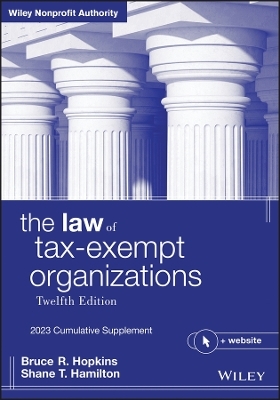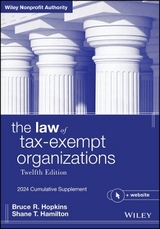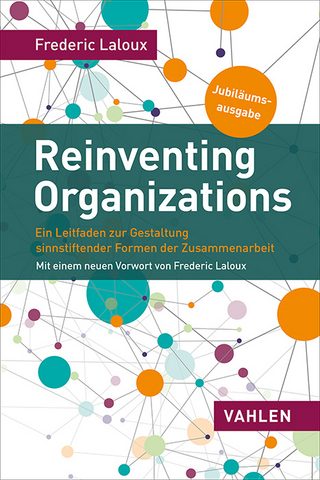
The Law of Tax-Exempt Organizations
John Wiley & Sons Inc (Verlag)
978-1-119-98532-7 (ISBN)
- Titel erscheint in neuer Auflage
- Artikel merken
A Letter to the Reader xv
About the Authors xvii
Preface xix
About the Online Resources xxi
Book Citations xxiii
Part One: Introduction to the Law of Tax-exempt Organizations
1 Definition of and Rationales for Tax- Exempt Organizations 3
§ 1.1 Definition of Nonprofit Organization 3
(a) Nonprofit Organization Defined 3
§ 1.2 Definition of Tax- Exempt Organization 4
§ 1.4 Political Philosophy Rationale 4
2 Overview of Nonprofit Sector and Tax- Exempt Organizations 5
§ 2.1 Profile of Nonprofit Sector 5
§ 2.2 Organization of IRS 7
(a) IRS in General 7
(a- 1) Prospective Restructuring of IRS 7
(b) Tax Exempt and Government Entities Division 8
Part Two: Fundamentals of the Law of Tax-exempt Organizations
3 Tax Exemption: Source and Recognition 11
§ 3.2 Recognition of Tax Exemption 11
(a) General Rules 11
§ 3.3 Recognition of Public Charity, Private Foundation Status 11
4 Organizational, Operational, and Related Tests and Doctrines 13
§ 4.1 Forms of Tax- Exempt Organizations 13
(a) General Rules 13
§ 4.3 Organizational Test 13
(e) Rules for Limited Liability Companies 14
§ 4.4 Primary Purpose Test 16
§ 4.5 Operational Test 16
(a) Basic Rules 16
§ 4.7 Commensurate Test 16
§ 4.8 State Action Doctrine 16
(d) Statutory Law 16
§ 4.9 Commerciality Doctrine 16
(e) Other Applications of Doctrine 16
(f) Elements of Commerciality 17
(g) IRS Ruling Policy 17
(h) Contemporary Perspective on Doctrine 18
5 Nonprofit Governance 19
§ 5.3 Board Duties and Responsibilities 19
(a) Duty of Care 19
(b) Duty of Loyalty 20
(c) Duty of Obedience 20
§ 5.7 IRS and Governance 20
(c) IRS Ruling Policy 20
Part Three: Tax-exempt Charitable Organizations
6 Concept of Charitable 25
§ 6.2 Public Policy Doctrine 25
(a) General Principles 25
(b) Race- Based Discrimination 25
§ 6.3 Collateral Concepts 26
(a) Requirement of Charitable Class 26
(i) Illegal Activities 26
7 Charitable Organizations 29
§ 7.2 Relief of Distressed 29
(b) Disaster Relief Programs 29
§ 7.4 Provision of Housing 34
§ 7.6 Promotion of Health 34
(a) Hospital Law in General 35
(b) Additional Statutory Requirements for Hospitals 36
(m) Accountable Care Organizations 36
§ 7.7 Lessening Burdens of Government 36
§ 7.8 Advancement of Education 37
§ 7.11 Promotion of Social Welfare 38
§ 7.14 Fundraising Organizations 38
(c) Other Exemption Issues 38
§ 7.15 Instrumentalities of Government 38
§ 7.16 Other Categories of Charity 38
(a) Environmental Protection 38
(e) Local Economic Development 39
§ 7.17 Qualified Opportunity Zones 39
8 Educational Organizations 41
§ 8.3 Educational Institutions 41
(a) Schools, Colleges, and Universities 41
§ 8.4 Instruction of Individuals 42
§ 8.5 Instruction of Public 42
9 Scientific Organizations 45
§ 9.2 Concept of Research 45
10 Religious Organizations 47
§ 10.1 Constitutional Law Framework 47
(a) General Constitutional Law Principles 47
(c) Internal Revenue Code Provisions 48
§ 10.2 Federal Tax Law Definition of Religion 48
(c) Abuse of Tax Exemption 48
§ 10.3 Churches and Similar Institutions 48
(b) Associational Test 48
(c) Principle of Respect for Autonomy 48
§ 10.5 Integrated Auxiliaries of Churches 49
§ 10.7 Religious Orders 49
11 Other Types of Charitable Organizations 51
§ 11.2 Amateur Sports Organizations 51
§ 11.8 Donor- Advised Funds 51
(b) Statutory Criteria 51
(c) Portrait of Donor- Advised Fund Universe 51
(d) Litigation 53
§ 11.9 Endowment Funds 54
(b) College and University Endowment Tax 54
12 Public Charities and Private Foundations 59
§ 12.1 Federal Tax Law Definition of Private Foundation 59
(a) Private Foundation Defined 59
(b) Private Operating Foundations 59
(d) Conduit Foundations 59
§ 12.3 Categories of Public Charities 59
(b) Publicly Supported Charities 59
(c) Supporting Organizations 61
§ 12.4 Private Foundation Rules 62
(f) Other Provisions 62
Part Four: other Tax-exempt Organizations
13 Social Welfare Organizations 65
§ 13.1 Concept of Social Welfare 65
(a) General Rules 65
(b) Benefits to Members 65
§ 13.3 Conduct of Business 66
14 Business Leagues and Similar Organizations 67
§ 14.1 Concept of Business League 67
(a) General Principles 67
(g) Certification Programs 67
§ 14.2 Disqualifying Activities 68
(a) Line- of- Business Requirement 68
(b) For- Profit Business Activities 68
(c) Performance of Particular Services 68
(d) Private Inurement and Private Benefit 69
15 Social Clubs 71
§ 15.1 Social Clubs in General 71
(b) Club Functions 71
§ 15.3 Investment Income Limitation 72
§ 15.4 Exceptions to Limitations 72
§ 15.5 Taxation of Social Clubs 72
16 Labor, Agricultural, and Horticultural Organizations 73
§ 16.1 Labor Organizations 73
§ 16.2 Agricultural Organizations 73
17 Political Organizations 75
§ 17.4 Public Policy Advocacy Activities 75
§ 17.5 Taxation of Political Organizations 75
18 Employee Benefit Funds 77
§ 18.3 Voluntary Employees’ Beneficiary Associations 77
19 Other Categories of Tax- Exempt Organizations 79
§ 19.4 Fraternal Organizations 79
(a) Fraternal Beneficiary Societies 79
(b) Domestic Fraternal Societies 79
§ 19.6 Cemetery Companies 80
§ 19.9 Insurance Companies and Associations 80
§ 19.11 Veterans’ Organizations 80
(a) General Rules 80
§ 19.12 Farmers’ Cooperatives 80
§ 19.14 Homeowners’ Associations 80
§ 19.18 Qualified Health Insurance Issuers 80
§ 19.20 ABLE Programs 80
§ 19.21 Professional Sports Leagues 81
§ 19.22 Governmental and Quasi- Governmental Entities 81
(a) Intergovernmental Immunity 81
(b) Income Exclusion Rule 82
(c) Integral Parts of States 82
§ 19.24 Other Categories of Tax- Exempt Organizations 82
Part Five: Principal Exempt Organization Laws
20 Private Inurement and Private Benefit Doctrines 85
§ 20.4 Compensation Issues 85
(b) Determining Reasonableness of Compensation 85
§ 20.5 Executive Compensation Tax 86
(a) Statutory Law 86
(b) Perspectives 86
(c) Regulations 87
(d) TIGTA Examination 91
§ 20.6 Other Forms of Private Inurement 91
(a) Rental Arrangements 91
(b) Lending Arrangements 92
(c) Sales of Assets 92
(e) Equity Distributions 92
(h) Tax Avoidance Schemes 92
(i) Services Rendered 92
(j) Business Referral Operations 93
(l) Retained Interests 93
(m- 1) Successors to For- Profit Companies 93
§ 20.10 Private Inurement and Business Leagues 94
§ 20.12 Private Inurement and Other Categories of Exempt Organizations 94
§ 20.13 Private Benefit Doctrine 95
(a) General Rules 95
(c) Joint Venture Law 96
(d) Perspective 97
21 Intermediate Sanctions 99
§ 21.3 Disqualified Persons 99
§ 21.4 Transactions Involved 100
(c) Automatic Excess Benefit Transactions in General 100
§ 21.14 Return for Payment of Excise Taxes 100
§ 21.16 Interrelationship with Private Inurement Doctrine 100
22 Legislative Activities by Tax- Exempt Organizations 101
§ 22.3 Lobbying by Charitable Organizations 101
(b) Concept of Lobbying 101
(c) Substantial Part Test 101
(d) Expenditure Test 101
§ 22.6 Legislative Activities of Business Leagues 102
(a) Business Expense Deduction Disallowance Rules 102
(c) Proxy Tax Rules 102
23 Political Campaign Activities by Tax- Exempt Organizations 103
§ 23.2 Prohibition on Charitable Organizations 103
(b) Participation or Intervention 103
§ 23.3 Political Campaign Expenditures and Tax Sanctions 103
§ 23.6 Political Activities of Social Welfare Organizations 104
(a) Allowable Campaign Activity 104
24 Unrelated Business: Basic Rules 105
§ 24.1 Introduction to Unrelated Business Rules 105
§ 24.2 Definition of Trade or Business 105
(e) Charging of Fees 105
(j) Concept of Investment Plus 105
§ 24.3 Definition of Regularly Carried On 106
(a) General Principles 106
(b) Determining Regularity 106
§ 24.4a Deemed Unrelated Business Income 106
§ 24.5 Contemporary Applications of Unrelated Business Rules 106
(e) Business Leagues 106
(i) Fundraising 107
(q) Other Organizations’ Exempt Functions 107
§ 24.9 Unrelated Debt- Financed Income 107
(b) Debt- Financed Property 107
(c) Acquisition Indebtedness 107
(d) Exempt Function Borrowing 108
(e) Administrative Needs Borrowing 108
25 Unrelated Business: Modifications, Exceptions, Special Rules, and Taxation 111
§ 25.1 Modifications 111
(g) Royalties 111
(h) Rent 112
(i- 1) Income from Controlled Entities 112
(n- 1) Global Intangible Low- Taxed Income 113
§ 25.2 Exceptions 113
(a) Volunteer- Conducted Businesses 113
(b) Convenience Businesses 114
(c) Sales of Gift Items 114
(h) Gambling 115
(j) Low- Cost Articles 115
(l) Associate Member Dues 115
§ 25.3 Special Rules 115
§ 25.4 Fringe Benefit Rules 116
§ 25.5 “Bucketing” Rule 116
(a) Statutory Law 116
(b) Regulations 117
(c) Medical Marijuana Dispensary Cases 121
§ 25.7 Deduction Rules 122
(a) General Rules 122
(b) Charitable Deduction 123
(c) Specific Deduction 123
(d) Net Operating Losses 123
Part Six: Acquisition and Maintenance of Tax Exemption
26 Exemption Recognition and Notice Processes 127
§ 26.1 Recognition Application Procedure 127
(a) Introduction 127
(b) General Procedures 129
(c) Completed Application 131
(d) User Fees 131
(e) Penalties for Perjury 132
(g) Streamlined Application 132
(h) Reliance on Determination Letters 133
(i) Post- Determination Review 133
§ 26.3 Nonprivate Foundation Status 134
(a) Notice Requirement 134
(b) Rules for New Publicly Supported Charities 134
§ 26.4 Requirements for Social Welfare Organizations 134
§ 26.8 Requirements for Certain Health Insurance Issuers 135
§ 26.10 Rules for Other Categories of Organizations 135
§ 26.10A Determination Letter Requests on Form 8940 135
(a) General Rules 135
(b) Changes in Public Charity/Private Foundation Status 136
§ 26.10b Withdrawal of Request for Determination Letter 137
§ 26.11 Group Exemption Rules 137
(a) General Rules 137
(b) Advantages and Disadvantages of Group Exemption 138
(c) Proposed Revised Procedures 138
§ 26.12 Suspension of Tax Exemption 142
§ 26.13 Notice Requirements for Social Welfare Organizations 143
§ 26.14 Notice Requirements for Political Organizations 143
§ 26.16 Forfeiture of Tax Exemption 143
§ 26.17 Constitutional Law Aspects of Process 144
27 Administrative and Litigation Procedures 147
§ 27.1 Administrative Procedures Where Recognition Denied 147
(a) Requests Receiving Appeals Office Consideration 147
(b) Matters Not Receiving Appeals Office Consideration 148
27.2 Revocation or Modification of Tax- Exempt Status: Administrative Procedures 149
§ 27.3 Retroactive Revocation of Tax- Exempt Status 149
§ 27.4 Statute of Limitations Matters 150
§ 27.5 Revocation of Tax- Exempt Status: Litigation Procedures 150
(a) General Rules 150
(b) Declaratory Judgment Rules 152
§ 27.6 IRS Examination Procedures and Practices 153
(a) General IRS Exempt Organizations Audit Procedures and Practices 153
(b) IRS Exempt Organizations Examination Guidelines 155
(c) Church Audits 159
§ 27.9 IRS Disclosure to State Officials 159
28 Operational Requirements 161
§ 28.1 Changes in Operations or Form 161
(a) Changes in Operations 161
§ 28.2 Annual Reporting Rules 162
(a) Overview of Annual Information Returns 162
(b) Content of Annual Information Returns 164
(c) Exceptions to Reporting Requirements 166
(e) Group Returns 167
§ 28.3 Notification Requirement 168
§ 28.5 Filing Requirements and Tax- Exempt Status 168
§ 28.8 Electronic Filing Rules 168
(d) Law Revision in 2020 168
§ 28.9 Unrelated Business Income Tax Returns 169
§ 28.10 IRS Document Disclosure Rules 170
(a) Federal Tax Law Disclosure Requirements 170
§ 28.11 Document Disclosure Obligations of Exempt Organizations 170
(a) General Rules 170
(d) Failure to Comply 170
(g) Penalties 170
(i) Donor Information Disclosure 171
(j) Donor Information Disclosure— State Fundraising Laws 172
§ 28.14 Insurance Activities 176
(b) Commercial- Type Insurance Rules 176
(c) Charitable Split- Dollar Insurance Plans 176
§ 28.17 Tax- Exempt Organizations and Tax Shelters 176
§ 28.17 International Grantmaking Requirements 176
(a) Charitable Organizations Generally 177
(b) Private Foundations 177
(c) Anti- Terrorist Financing Guidelines 178
§ 28.18 Recordkeeping Requirements 178
28A Tax- Exempt Organizations and Tax Shelters 179
§ 28a.1 Concept of Tax Shelter 180
§ 28a.2 Judicial Doctrines 181
(a) Sham Transaction Doctrine 181
(b) Economic Substance Doctrine 182
(c) Business Purpose Doctrine 182
(d) Substance- over- Form Doctrine 182
(e) Step Transaction Doctrine 183
(f) Countervailing Case Law 184
§ 28a.3 Tax Shelter Law in General 185
(a) IRS’s Office of Tax Shelter Analysis 185
(b) Other IRS Initiatives 185
(c) Reportable Transactions 186
(d) Participation in Reportable Transactions 187
(e) Participant Disclosure Requirements 188
(f) Material Advisor Disclosures 189
(g) Material Advisors Lists Requirements 189
(h) Abusive Tax Shelter Promotion Penalty 189
(i) Other Tax Shelter Penalties 190
§ 28a.4 Exempt Organizations and Tax Shelter Penalties 191
§ 28a.5 Exempt Organizations’ Involvement in Shelters 193
(a) Transfers of Incidence of Taxation 193
(b) Abuse of Corporations Sole 195
(c) A Disputed Tax Shelter 195
(d) Overvaluation Is Often Key Issue 197
(e) “Charitable Giving” Plan Failed 198
(f) Syndicated Conservation Easements 199
(g) Donor- Advised Funds 200
(h) Patient Assistance Programs 201
(i) Other Tax Shelters in Exempt Organizations Context 201
§ 28a.6 GAO Findings and Recommendations 202
§ 28a.7 “Dirty Dozen” Listings 204
Part Seven: Interorganizational Structures and Operational Forms
29 Tax- Exempt Organizations and Exempt Subsidiaries 207
§ 29.2 Charitable Organizations as Subsidiaries 207
(b) Subsidiaries of Domestic Organizations 207
§ 29.3 Tax- Exempt Subsidiaries of Charitable Organizations 207
§ 29.7 Revenue from Tax- Exempt Subsidiary 207
30 Tax- Exempt Organizations and For- Profit Subsidiaries 209
§ 30.2 Potential of Attribution to Parent 209
31 Tax- Exempt Organizations and Joint Ventures 211
§ 31.3 Whole- Entity Joint Ventures 211
(b) IRS Guidance 211
32 Tax- Exempt Organizations: Other Operations and Restructuring 213
§ 32.1 Mergers 213
§ 32.6 Conversion from Exempt to Nonexempt Status 213
(a) State Law 213
§ 32.7 Conversion from Nonexempt to Exempt Status 213
(b) Federal Tax Law 213
(b- 1) Focus on College Conversions 215
§ 32.8 Conversion from One Exempt Status to Another 217
Index 219
| Erscheinungsdatum | 11.07.2023 |
|---|---|
| Verlagsort | New York |
| Sprache | englisch |
| Maße | 175 x 254 mm |
| Gewicht | 386 g |
| Themenwelt | Wirtschaft ► Betriebswirtschaft / Management ► Planung / Organisation |
| ISBN-10 | 1-119-98532-3 / 1119985323 |
| ISBN-13 | 978-1-119-98532-7 / 9781119985327 |
| Zustand | Neuware |
| Haben Sie eine Frage zum Produkt? |
aus dem Bereich



